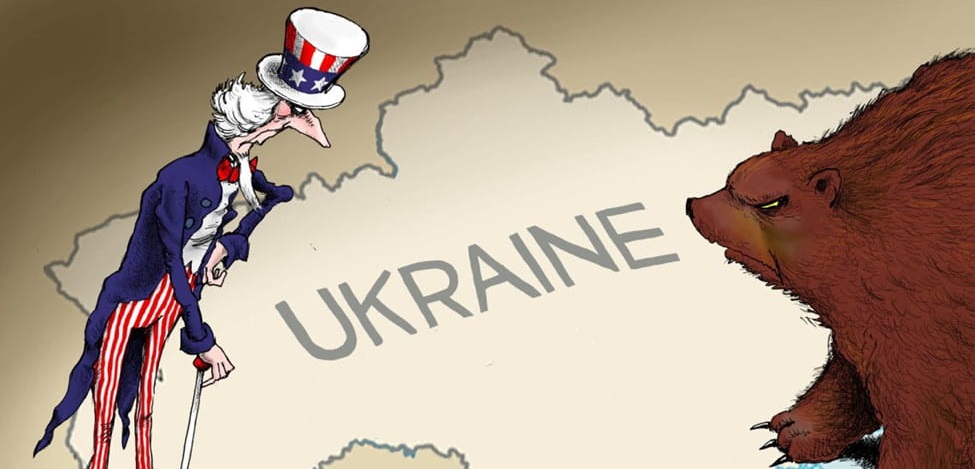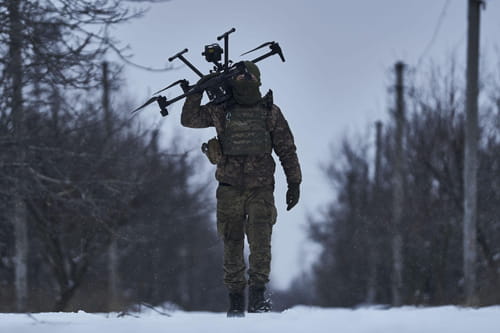
Photo Credit: Geopolitical Intelligence Services
To be militarily effective in war, it is of utmost necessity for India to recognise that in all domains of warfare – army, navy, air force, space, cyber and electronic warfare, and in all dimensions, physical, informational and cognitive, adaptation will be all important. Militaries will invariably confront problems posed by imaginative adversaries with asymmetrical force and technological advantage, as also of unfathomable strategy. The lines between peace and war have been blurred into irrelevance. Israel was deeming itself to be in a peaceful time! India, in peace, hence remains in a state of challenges, undeclared and unending!
Introduction
The Russia-Ukraine War has thrown up an overabundance of geopolitical, geo-economic and geostrategic lessons. In fact, learning from war is a serious business: there also ought to be a learning culture, on conduct of war fighting, future capability matrix and optimal military organisations in future conflicts! It, however, must be said that lives of the future military generations and the reputation of the Indian nation depends on learning and adaptation.
Military strategists globally have been analysing the Russia-Ukraine war, in all manifestations, and absorbing lessons for future warfare. The war has been also called the first full-scale drone war. Drones have transformed what were once “dumb” artillery rounds into precision weapons. On its part, the US Army has learned lessons from the war like the use of drones to help artillery locate targets and countering unmanned aircraft systems.It is relevant to mention that India’s adversarial neighbour in the north, China has been continually reappraising the war and drawing lessons, something which India needs to follow closely.
Military Lessons for India
Contextually, in this stream of lessons being generated of the Russian-Ukraine War, seven need focus and examination for India.
The first lesson is that war is not inevitable. As the previous and ongoing wars have shown, the economic costs globally have been very severe and long lasting, the humanitarian costs overwhelming and devastating. Political sagacity and diplomatic acumen were essential to avert the immense bloodshed and human miseries. Politico-diplomacy has to look ahead, build relationships, explore drivers and trends, heed warnings on the horizon, and prevent an explosion to a war. Once a war commences, it runs its own course, with no assurances of the end-state or victory or defeat.
Second, excessive reliance on global support may be another fallacy. Deliberate strategic ambiguity and uncertainty, driven by internal political complications like the US Congress, is feasible. As many of the UN resolutions have shown, a number of countries hedge their positions and avoid taking sides during wars, despite sympathising with one or the other side.
Although India has many strategic partners, in the eventuality of a war, many other forces will come into play – like the market forces and trade issues. Inevitably, the transition happening in global geopolitics will come to play. While some support – especially in military wherewithal and intelligence, is feasible, its timeliness will have to be seen. Obviously, the Western military-industrial complex will salivate at the possibility of pecuniary gains, with a protracted conflict! This is an era of self-help! The war will have to be prosecuted within the finite capacities of the Indian nation. That must become the bottom-line for national capacity-building.
Third, reliance on economic interdependence with adversaries to decrease the chance of war is another fallacy! Trade relationships lead to positive expectations and provide incentive to stay peaceful. That economic interdependence will constitute a safeguard against war, is not tenable; political considerations come first. Russia’s weaponization of interdependence on Russian energy supplies to Europe (and Ukraine) have not stood up to propel peace. As a corollary, Chinese commercial interests and growing trade with India cannot influence the Communist Party of China’s (CPC) political leadership for belligerence against India.
Fourth, peace based on agreements is fragile and illusory. Ukraine-Russia 2022 has proven what India witnessed against China in 2020. With five strong India-China agreements from 1993 to 2013, and the Minsk 1 and 2 between Ukraine and Russia, it is simple to see how easy it is for nations to break treaties and faith and how quickly a situation can transcend to genuine catastrophe. India had over three decades to convince itself to believe that “this cannot happen here”, and overnight that illusion was shattered.
Fifth, the unthinkable: 20th century conventional warfare is equally possible in the 21st century, even with modern technological wars! The most important and brutal lesson of Ukraine is that major conventional wars with linear defences like in the First World War between large nations is possible — even under the shadow of modern technology and nuclear weapons. For decades, we have viewed major conventional wars as a relic of the past for fair and logical reasons. “Hard power” is back with a vengeance, as the Ukraine and Gaza wars have shown. The need for real kinetic capability and the national will to use it are imperative. For us too, territorial bickering by the adversary as the stated objective cannot be taken as the only bedrock of mutual differences. War can have geopolitical aim; territory can be an illusion to disallow India to reach her ‘potential’.

A Ukrainian soldier carrying a drone in the Donetsk region. Photo Credit: AP/The Atlantic
It is essential to consider the battlefield adaptations undertaken by both sides: Ukraine and Russia. The Russians appeared initially to have given little heed to drones and loitering munitions that were to make traditional arms vulnerable. Ukraine’s innovative approach also allowed it to execute newer battlefield technologies and tactics that caused great upset to the Russian military. There have been many other important innovations like explosive sea drones, which have been able to strike and damage Russian warships and oil tankers in the Black Sea. Ukraine's military leadership had prioritised projects that included robotic systems, electronic warfare, artificial intelligence tools, cyber security, communications, and information security management systems.
Sixth, wars can have unpredictable outcomes, as the ongoing war in Ukraine indicates. Outcome of all out warfare is unpredictable and cannot be predicted from net-assessments, algorithms, war games, war-simulations and limited exercises. The intangibles and uncertainties in fog of war do not lend themselves to quantification as evident in the battlefields of Ukraine. There is an immense role of morale, national and military leadership, intuition, initiative, imagination, discipline, deception and indeed motivation. In fact, even clear technological superiority has not been forceful enough to compel favourable outcomes or rapid decisions.
Learning from the ongoing war, a strong adversary will seek a short war, to avoid a scenario of protraction and even the likelihood of loss of face! War will remain a test of logistics and industrial capacity - transport, huge amounts of ammunition, maintenance and battlefield and tertiary medical care.
In the same context is the issue of treachery and betrayal of trust and confidence by adversaries! India has had her share of treachery. Prime Minister Vajpayee was a sincere peacemaker when he undertook the bus to Lahore in February 1999, was received by Prime Minister Nawaz Sharif and the units of the Pakistan Army gave the Indian Prime Minister a guard of honour. All this while General Musharraf was treacherously executing plans to occupy the heights of Kargil that led to a bitter war from May to July in the same year! In matters of appreciating adversarial conduct, India has to be mindful of treachery and avoid complacency.
Seventh and lastly, deterrence, as an attempt to discourage potential perpetrators by influencing their assessment of costs relative to potential gains, cannot assure peace. The large Russian war machine could not deter war in Ukraine. The concept of deterrence - punitive/dissuasive in India, is one of the most dominant, and is considered important to develop necessary strategic and operational capabilities. India, hence, does not have the luxury of easing-off on defensibility of disputed borders.
Conclusion
In sum, complacency will be detrimental to national security. Apparently, riding on its own strength and overconfidence of NATO support, Ukrainian security forces and the intelligence establishment had been complacent. India has had her share of being surprised in history like in 1948, 1962, 1965, 1999, 2008 and 2020. Complacency hence can lead to war-like situations, and this highlights the all-importance of battlefield transparency.
To be militarily effective in war, it is of utmost necessity for India to recognise that in all domains of warfare – army, navy, air force, space, cyber and electronic warfare, and in all dimensions, physical, informational and cognitive, adaptation will be all important. Militaries will invariably confront problems posed by imaginative adversaries with asymmetrical force and technological advantage, as also of unfathomable strategy. The lines between peace and war have been blurred into irrelevance. Israel was deeming itself to be in a peaceful time! India, in peace, hence remains in a state of challenges, undeclared and unending!
(Exclusive to NatStrat)